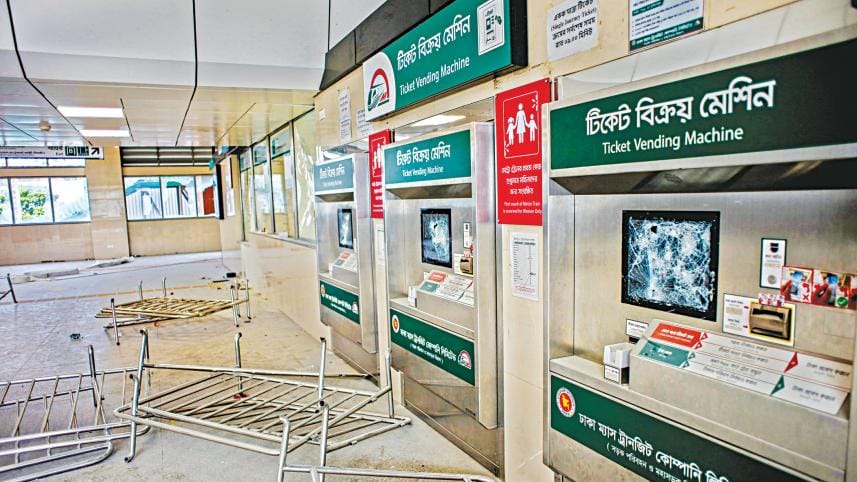Repairs to metro rail will cost public funds in absence of insurance

Public funds will be used to pay for repairs to Dhaka Metro Rail stations in the capital's Kazipara and Mirpur-10 areas as the popular mass rapid transit system is uninsured.
Mohammad Zakaria, additional director of the Mass Rapid Transit (MRT) Line-6 project, said the previous government did not insure the metro rail after it began operations in late 2022.
However, the project was under coverage during construction, he added.
The stations were damaged amid clashes between pro-government forces and protesters during a recent mass uprising that ended with Sheikh Hasina's resignation from her post as prime minister.
However, the repair costs will put more pressure on the public treasury, an official of the Sadharan Bima Corporation, the only state-owned non-life insurer, said on condition of anonymity.
"If it had been insured, the government wouldn't have to pay for repairs from its coffers," the official added.
An official of the Dhaka Mass Transit Company Limited, which operates the metro rail, said the cost of repairs should not exceed Tk 50 crore.
He also informed that everything inside the metro stations, including ticket vending machines, police control rooms, computers, and security systems, had been smashed to bits.
On the evening of July 19, unidentified miscreants took advantage of the ongoing unrest to carry out mindless attacks on the Mirpur-10 and Kazipara stations.
Although the metro rail is set to resume operations on August 17, the two stations will remain shuttered until repairs are complete.
Before the service was halted, more than 3 lakh people used the metro rail daily.
Citing that insurance coverage would have at least reduced the burden, the Sadharan Bima official said a reluctance to get insurance is a longstanding problem in Bangladesh.
"We want every state-owned asset to be insured, but our country does not have that culture. People abroad mitigate their risks with insurance, but we sit on it and that is a big problem."
An official of the Financial Institutions Division under the Ministry of Finance echoed the same.
"If the government had opted for insurance, the cost of repairs would not strain on the public treasury," the official said.
In February this year, the Insurance Development and Regulatory Authority sought cooperation from ministries and other public entities to expand insurance coverage in the country.
The insurance regulator sent a letter to the Financial Institutions Division on February 15, seeking an inter-ministerial meeting in this regard.
Currently, insurance penetration stands at less than 1 percent in Bangladesh, which has a population of around 170 million.
The letter also pointed out that the National Insurance Policy 2014 informs of the economic and social benefits of life insurance as well as insuring health, education, factories, residential and office buildings, agriculture, fisheries and livestock, and more.
Md Main Uddin, a professor of banking and insurance at the University of Dhaka, said the former government most likely opted against insurance as it was confident such incidents would never occur.
"The government should think about bringing all important projects under insurance. Then they will be paid compensation if there is any damage," he added.
The MRT Line-6, the country's first metro rail, was made partially operational from Uttara to Agargaon in December 2022. The Agargaon-Motijheel section was opened in October last year.
The Awami League government implemented a Tk 33,472 crore project to build a 21.26-kilometre rail line from Uttara to Kamalapur, with most of the funds loaned from Japan.




 For all latest news, follow The Daily Star's Google News channel.
For all latest news, follow The Daily Star's Google News channel.
Comments